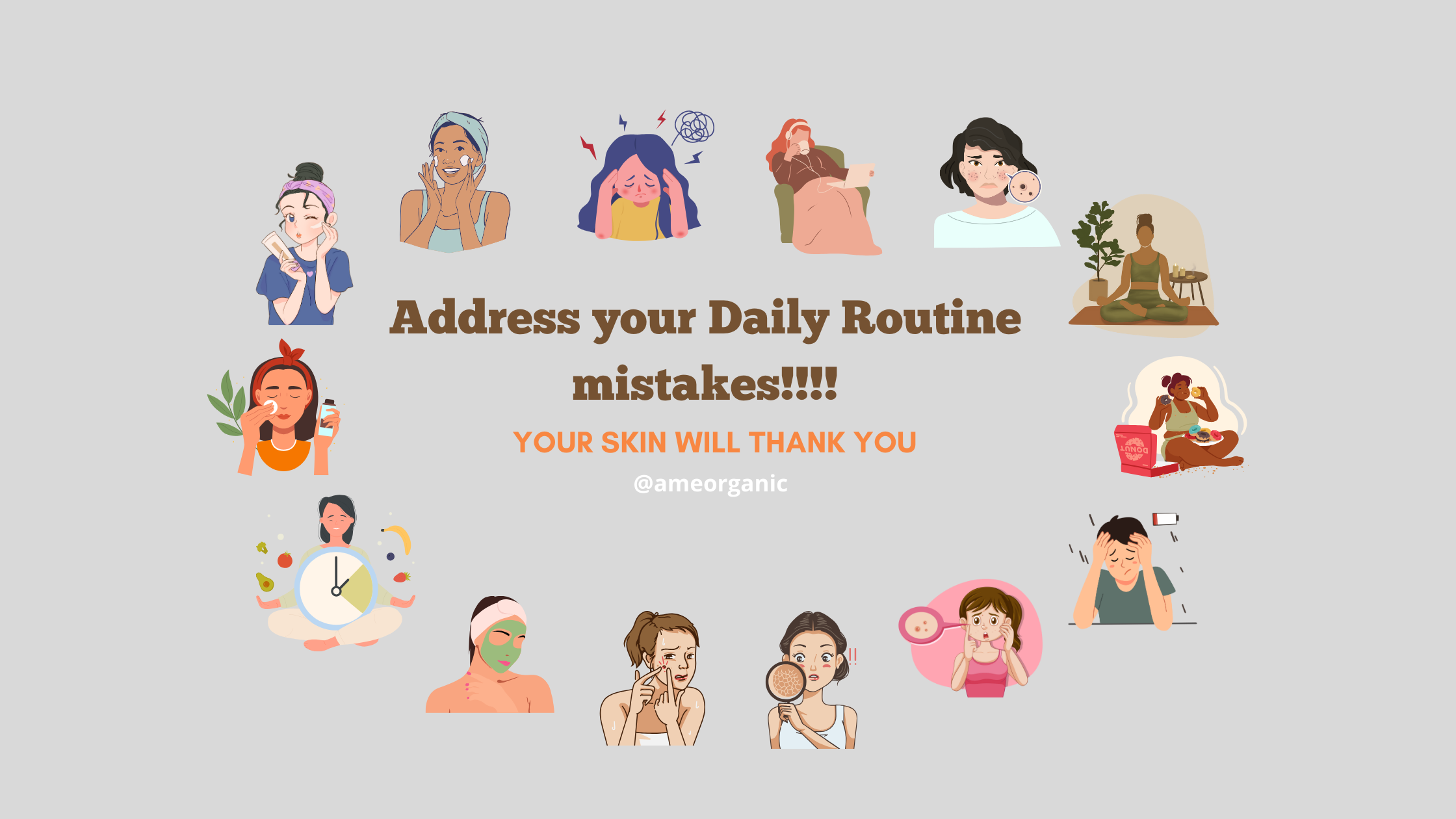Our skin is like a mirror, reflecting not just what we put on it but also how we live our lives. While we often attribute acne and other skin problems to genetics or harsh skincare products, the truth is that our daily habits play a significant role too. Here’s a deep dive into the common lifestyle mistakes that might be sabotaging your skin, and what you can do to break the cycle.
Is Your Daily Routine Causing Skin Problems? Learn What Not to Do
-
Over-Cleansing: More Isn’t Always Better
Many of us believe that the key to clear skin is keeping it squeaky clean. So, we scrub, cleanse, and exfoliate in an attempt to banish every trace of oil and dirt. However, over-cleansing can strip your skin of its natural oils, causing it to overcompensate by producing even more oil—leading to clogged pores and breakouts.
What to Do Instead:
Stick to cleansing twice a day—once in the morning and once before bed. Opt for a gentle, pH-balanced cleanser that removes impurities without stripping your skin of its natural moisture barrier.
-
Skipping Sunscreen: A Recipe for Premature Aging and Breakouts
Many people skip sunscreen because they believe it makes their skin oily or causes breakouts. However, the sun’s harmful UV rays can exacerbate skin issues, leading to hyperpigmentation, premature aging, and even worsening acne scars.
What to Do Instead:
Use a broad-spectrum sunscreen with at least SPF 30 every day, rain or shine. If you’re worried about greasiness, look for non-comedogenic, oil-free formulas designed specifically for acne-prone skin.
-
Unhealthy Diet: You Are What You Eat
Diet plays a more significant role in skin health than many realize. Consuming a diet high in sugar, dairy, and processed foods can lead to inflammation and trigger acne. For instance, high-glycemic foods can cause a spike in insulin, which may increase oil production and lead to breakouts.
What to Do Instead:
Incorporate more skin-friendly foods into your diet, like leafy greens, berries, fatty fish, and nuts. These foods are rich in antioxidants, omega-3 fatty acids, and other nutrients that promote healthy skin. Also, try to minimize your intake of sugary snacks, sodas, and processed foods.
-
Touching Your Face: Hands Off!
It’s almost a reflex—resting your chin in your hands, rubbing your forehead when stressed, or picking at a pimple. Every time you touch your face, you transfer bacteria, dirt, and oil from your hands to your skin, which can lead to clogged pores and acne.
What to Do Instead:
Be mindful of how often you touch your face during the day. If you feel the urge, try to replace it with another habit, like squeezing a stress ball. And remember, always wash your hands before applying skincare products or makeup.
-
Inconsistent Skincare Routine: The On-Again, Off-Again Approach
Using skincare products inconsistently or switching products too frequently can confuse your skin and prevent you from seeing the benefits of a consistent routine. Your skin needs time to adjust to new products, and results are often only visible after several weeks of regular use.
What to Do Instead:
Stick to a simple, consistent skincare routine tailored to your skin type. Give products at least 4-6 weeks before deciding if they work for you. And resist the temptation to try every new product on the market—sometimes less is more.
-
Poor Sleep Habits:
Lack of sleep doesn’t just make you feel tired—it shows on your skin too. When you don’t get enough rest, your body releases more of the stress hormone cortisol, which can trigger inflammation and breakouts. Plus, your skin repairs itself while you sleep, so cutting your rest short can interfere with this process.
What to Do Instead:
Aim for 7-9 hours of quality sleep each night. Establish a relaxing bedtime routine, keep your bedroom cool and dark, and try to go to bed at the same time each night to regulate your body’s internal clock.
-
Stress: The Silent Skin Destroyer
Stress doesn’t just affect your mood—it can wreak havoc on your skin too. When you’re stressed, your body produces more cortisol, which can increase oil production and lead to acne flare-ups. Stress can also trigger habits like touching your face, picking at your skin, or neglecting your skincare routine.
What to Do Instead:
Incorporate stress-reducing activities into your daily routine, such as yoga, meditation, or even just a few minutes of deep breathing exercises. Finding ways to manage stress not only benefits your mental health but can also improve your skin.
-
Neglecting to Clean Your Environment: A Dirty Secret
Your environment plays a crucial role in your skin’s health. Pillowcases, makeup brushes, and even your smartphone can harbor bacteria, oil, and grime that can transfer to your skin and cause breakouts.
What to Do Instead:
Wash your pillowcases and sheets at least once a week, clean your makeup brushes regularly, and wipe down your phone screen daily. Keeping your environment clean reduces the risk of transferring bacteria to your face.
-
Not Staying Hydrated: Quenching Your Skin’s Thirst
Drinking water may seem like a no-brainer, but many of us don’t drink enough throughout the day. Dehydration can make your skin look dull, emphasize fine lines, and even lead to increased oil production as your skin tries to compensate for the lack of moisture.
What to Do Instead:
Aim to drink at least 8 glasses of water a day. If you find plain water boring, try infusing it with slices of fruit or herbs like mint to make it more enjoyable. Remember, hydrated skin is happy skin.
-
Using Dirty Towels: An Overlooked Offender
We often overlook how frequently we should change the towels we use on our faces. Dirty towels can be a breeding ground for bacteria, which can transfer to your skin and lead to breakouts or other skin irritations.
What to Do Instead:
Use a clean towel every time you wash your face. If that’s not practical, consider using disposable face cloths or changing your towel every couple of days. Always pat your face dry gently to avoid irritating your skin.
-
Over-Exfoliating: Scrubbing Away Your Skin’s Barrier
While exfoliation is important for removing dead skin cells, overdoing it can lead to irritation, redness, and breakouts. Scrubbing too often or using harsh exfoliants can strip away your skin’s protective barrier, making it vulnerable to damage.
What to Do Instead:
Limit exfoliation to 2-3 times per week, and choose a gentle exfoliant that suits your skin type. Always follow up with a good moisturizer to protect your skin’s barrier.
-
Hot Showers: Relaxing but Risky
Hot showers might feel soothing, but they can dehydrate your skin by stripping away its natural oils. This can leave your skin dry, flaky, and more prone to irritation.
What to Do Instead:
Stick to lukewarm water when washing your face and body. If you enjoy hot showers, limit their duration and moisturize your skin immediately after to lock in hydration.
-
Using Expired or Unsuitable Products: A Hidden Hazard
Using expired skincare or makeup products can cause irritation and breakouts. Products past their prime lose their effectiveness and can harbor bacteria. Similarly, using products that aren’t suited to your skin type can make existing issues worse.
What to Do Instead:
Regularly check the expiration dates of your skincare and makeup products. Dispose of any that have passed their shelf life. Also, consult with a dermatologist or skincare professional to find products that suit your specific skin needs.
-
Smoking: A Skin-Damaging Habit
Smoking not only affects your overall health but also takes a toll on your skin. It reduces blood flow, depletes essential nutrients, and accelerates the formation of wrinkles, leaving your skin looking dull and aged.
What to Do Instead:
Quitting smoking is the best thing you can do for your skin and overall health. If quitting is difficult, seek support from healthcare professionals or support groups to help you break the habit.
-
Eating Too Much Sugar: Sweet but Damaging
High sugar intake can trigger inflammation in the body, which may lead to skin issues like acne and premature aging. Sugar can also cause spikes in insulin levels, increasing oil production and potentially worsening skin conditions.
-
Sleeping with Makeup On: A Recipe for Breakouts
It might seem tempting to crash into bed without removing your makeup, especially after a long day. However, sleeping with makeup on can clog pores, lead to breakouts, and cause your skin to look dull. Makeup residue can also mix with natural oils and dirt, exacerbating skin issues.
What to Do Instead:
Always remove your makeup before going to bed, even if you’re tired. Use a gentle makeup remover or cleansing oil followed by your regular cleanser to ensure all makeup and impurities are thoroughly washed away.
Conclusion
In conclusion, it’s clear that our everyday habits can have a significant impact on our skin. Have you found yourself making any of these common mistakes? Whether it’s skipping sunscreen, over-cleansing, or neglecting your sleep, these small oversights can contribute to acne and other skin issues. The good news is that by recognizing and addressing these habits, you can take control of your skin’s health. Start making these simple changes today, and you’ll likely see a noticeable improvement in your complexion. Your skin will thank you!

